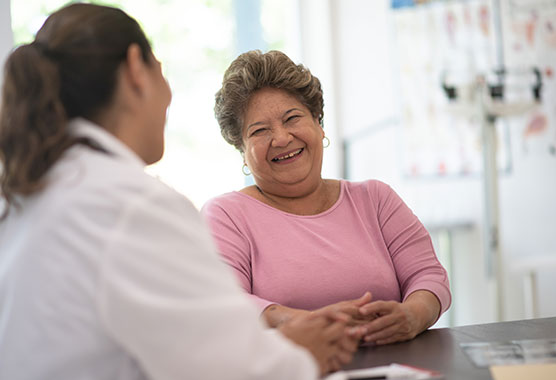Menopause
We’ll help you understand the signs of menopause. We’ll also provide treatment options for the symptoms you experience.
Medically reviewed by Elaine Waetjen, M.D. on Aug. 03, 2023.

What Is Menopause?
Menopause marks the end of your reproductive years when your ovaries stop releasing eggs. It begins 12 months after your menstrual cycles end.
Menopause occurs between the ages of 40 and 58 for most women, with an average age of 51. You may or may not experience symptoms during and after menopause.
UC Davis Department of Obstetrics and Gynecology (OB-GYN) offers the highest quality of care for every stage of your life. Our nationally recognized providers are experts in diagnosing and treating symptoms related to menopause.
Symptoms of Menopause
When you are in menopause, you may have very few symptoms. Or you may notice a lot of changes in your body that can be related to menopause and/or can be related to getting older. Some symptoms may start in the stage before menopause (perimenopause) and last beyond menopause.
Symptoms of Menopause
The primary symptom of menopause is not menstruating for 12 consecutive months. You may also experience one or more of these symptoms:
- Hot flashes
- Vaginal dryness and pain during sex
- Mood changes
- Sleep problems
- Brain fog
- Weight gain
Causes of Menopause
For most women, menopause is a natural physical process that occurs in your 40s or 50s. However, for some women, menopause can start as the result of a medical condition or procedure.
Age
For most women, natural menopause occurs between the ages of 40 and 58.
Autoimmune Disease
An autoimmune disease may cause you to begin menopause early (before age 40).
Chemotherapy or Radiation Therapy
Treatments for cancer like chemotherapy and radiation therapy can trigger premature (early) menopause.
Surgery
While having a hysterectomy stops your periods, surgery that removes your ovaries before menopause can cause symptoms of menopause unless you take hormone therapy.
Diagnosing Menopause
Your provider usually diagnoses menopause after discussing:
- Your medical history
- Changes in your menstrual cycle
- Your symptoms
It is uncommon that your provider would need to check any blood tests to determine if you have gone through menopause. In most cases, because hormones can vary from day to day, no single test can tell you when you are in menopause.
Treatments for Menopause
Our providers have expertise in treating the symptoms of menopause. Your treatment plan will focus on relieving your unique symptoms.
Hormone Therapy
Menopausal hormone therapy (MHT) is a treatment with estrogen and, for women who still have a uterus, a progestogen. MHT can relieve hot flashes and vaginal dryness, as well as improve some of the other symptoms that occur around menopause.
Medications
We may prescribe medicines like antidepressants to treat mood symptoms and as an alternative treatment for hot flashes.
Lifestyle Changes
We may recommend lifestyle changes to relieve many of your symptoms. To combat weight gain, choose vegetables, fruits and whole grains in your diet. Ensure you are adding exercise into your routine, with a focus on strength training. If you have hot flashes, try wearing layers of clothing that you can easily take off. For problems sleeping, practice good sleep habits, such as turning off electronics and avoiding late-night snacking. If you have vaginal dryness, use a personal lubricant.
Median Age
51Women in menopause
Early Menopause
5%Of women start menopause between ages 40 and 45
Source: National Library of Medicine: Menopause
Request an Appointment
As Sacramento's No. 1 hospital, you'll benefit from unique advantages in primary care and specialty care. This includes prevention, diagnosis and treatment options from experts in 150 specialties.
Referring Physicians
To refer a patient, submit an electronic referral form or call.
800-4-UCDAVIS
Patients
Call to make an appointment.
Consumer Resource Center
800-2-UCDAVIS

Ranked among the nation’s best hospitals
A U.S. News & World Report best hospital in cardiology, heart & vascular surgery, diabetes & endocrinology, ENT, geriatrics, neurology & neurosurgery, and pulmonology & lung surgery.

Ranked among the nation’s best children’s hospitals
U.S. News & World Report ranked UC Davis Children’s Hospital among the best in pediatric nephrology, orthopedics*, and pulmonology & lung surgery. (*Together with Shriners Children’s Northern California)

Ranked Sacramento’s #1 hospital
Ranked Sacramento’s #1 hospital by U.S. News, and high-performing in aortic valve surgery, back surgery (spinal fusion), COPD, colon cancer surgery, diabetes, gynecological cancer surgery, heart arrhythmia, heart failure, kidney failure, leukemia, lymphoma & myeloma, lung cancer surgery, pacemaker implantation, pneumonia, prostate cancer surgery, stroke, TAVR, cancer, orthopedics, gastroenterology & GI surgery, and urology.

The nation’s highest nursing honor
UC Davis Medical Center has received Magnet® recognition, the nation’s highest honor for nursing excellence.

World-class cancer care
One of ~59 U.S. cancer centers designated “comprehensive” by the National Cancer Institute.

A leader in health care equality
For the 13th consecutive year, UC Davis Medical Center has been recognized as an LGBTQ+ Healthcare Equality Leader by the educational arm of America’s largest civil rights organization.

